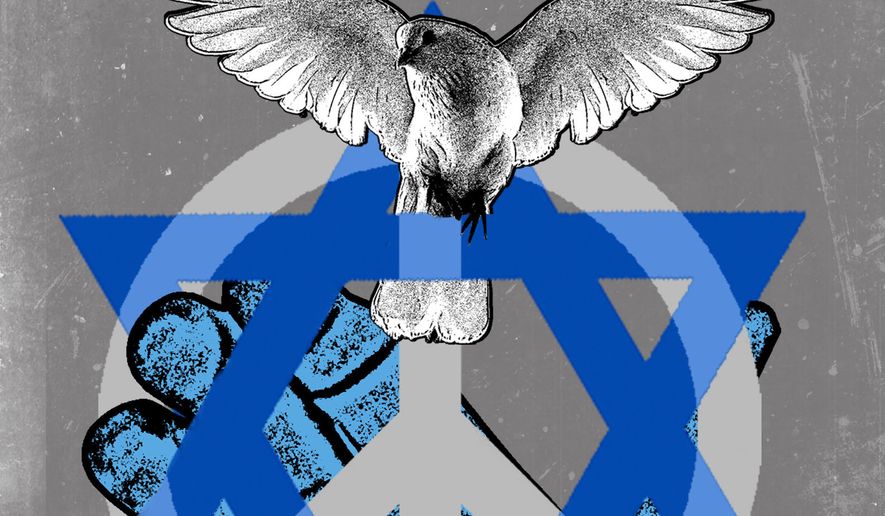OPINION:
Today marks two years since Hamas murdered more than 1,200 people in Israel, the bloodiest single day in the history of the modern Jewish state. Now, President Trump’s effort to end the ensuing conflict in the Gaza Strip seems to be moving forward.
With this latest Middle East proposal, we are witnessing the strategic end of the so-called “Palestinian cause” as a relevant political project. The ceaseless quest for a “two-state solution” has been exposed as the smokescreen for eternal delay, jihadi posturing and diplomatic extortion that it has always been.
Mr. Trump is offering not a ceasefire with Hamas, but rather a realignment of the region based on clarity of values, consequences for bad actors and normalization from the outside in. The game has changed. Mr. Trump has described it as “the whole deal, everything getting solved. It’s called peace in the Middle East.”
The president has successfully decoupled the Palestinian question from the broader regional peace process, saying late last month, “In our meeting … Prime Minister Benjamin Netanyahu was very clear about his opposition to a Palestinian state. And he continuously mentions Oct. 7, and I understand that. Most people do.” This was not a slip of the tongue. It is the core of the new vision.
Any honest analyst of the region has always known that the rest of the Arab world never truly cared about the so-called Palestinian cause but used it as a cudgel against Israel. Now, even they are dropping the charade and getting behind the new architecture that rewards nations willing to join the modern world and isolates those clinging to anti-Israel rejectionism.
This means an expansion of the Abraham Accords. Mr. Trump has taken a stalled but revolutionary framework and infused it with purpose and urgency. Gaza, in this context, is not the end goal but the entry point. It is being used as the catalyst to draw Arab and Muslim nations into a broader coalition based on shared interests and mutual threats.
According to Point 17, the deal moves forward whether Hamas accepts it or not. That makes Hamas irrelevant and turns the tables. The regional Arab countries are effectively blessing Israel’s campaign to eliminate Hamas. That endorsement, even if tacit, is unprecedented. It signals a recognition that Hamas and its benefactor Iran are a problem for the region, not just for Israel.
Qatar in particular finds itself boxed in. After Israeli strikes reportedly killed Hamas leaders, Qatar is now increasingly reliant on American security guarantees. It cannot afford to play host to terrorists and expect immunity. Israel is playing bad cop as the United States offers a protective hug. The result is the de facto containment of Hamas leadership under joint Israeli-U.S. watch.
Then there is Pakistan. Often overlooked in these discussions, it may prove to be a crucial piece. India is aligning more closely with Russia and China in a bid to play both sides of the global chessboard. Mr. Trump, never one to miss a counterpunch, may see Pakistan as a way to box out those two U.S. adversaries.
Indonesia is also close to coming on board. It is the world’s largest Muslim-majority country, and its inclusion would be a powerful symbolic victory. Indonesia has its own problem with jihadi extremism and Israel could offer meaningful assistance in intelligence and counterterrorism. More important, Indonesia’s participation would send a loud message that Islam itself is not incompatible with peace and normalization with the Jewish state.
Trump 1.0 proved that peace could be achieved from the outside in. Trump 2.0 is laying bare the fact that the so-called Palestinian cause, long dressed up in the language of justice and liberation, is nothing more than a vehicle for jihadi fantasy and corrupt governance.
European recognition of Palestinian statehood looks increasingly hollow. Last week, Mr. Trump mocked, “Several countries have foolishly recognized the Palestinian state. As you know, some of our European friends.” He attributed their actions to tired reflexes rather than principled decisions. He is right. These leaders are tired.
Mr. Trump is not. He is pressing forward with a vision that treats Israel as a legitimate member of the region and Hamas as a parasite that must be removed. He is telling what most of the Arab world has long known but was unwilling to acknowledge.
There are still holes to fill in this plan, but the strategic framework is sound. It rewards nations that choose peace. It isolates those that glorify violence. Most important, it breaks the tired mold of peace processing and replaces it with reality-based diplomacy.
The Palestinian cause is not being resolved. It is being retired.
• E.J. Kimball is the director of policy and strategic operations at the U.S. Israel Education Association and a foreign policy and national security consultant.




Please read our comment policy before commenting.